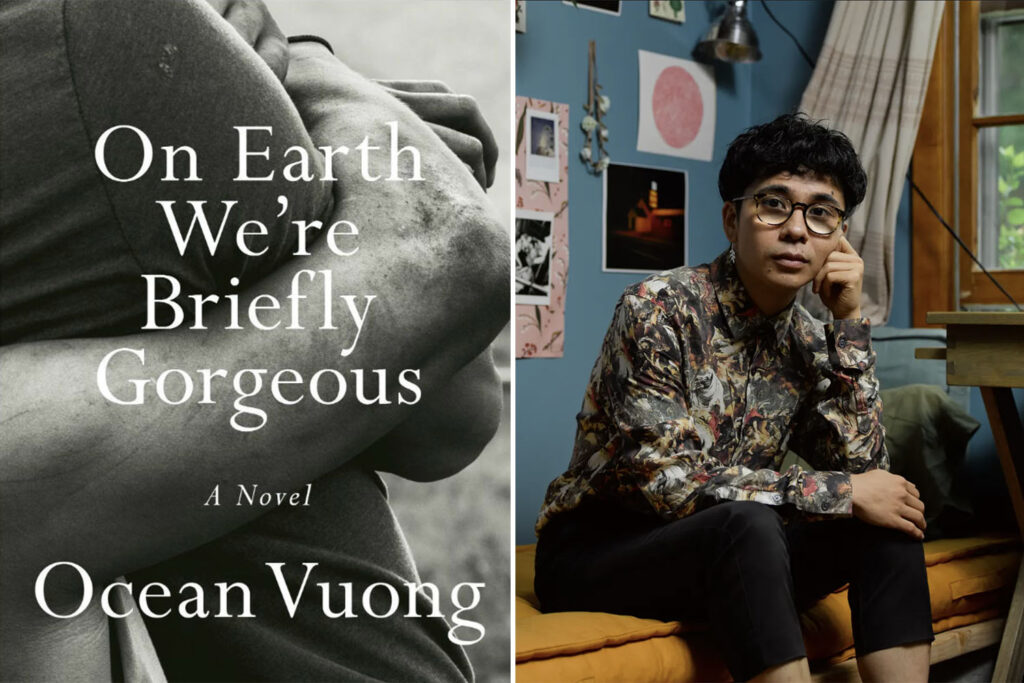By Cate Rosa, Alliance Intern from Boston University ’26
During Asian American and Pacific Islander (AAPI) Heritage Month, we celebrate the rich cultures and contributions of the AAPI community, reflecting on its diverse experiences. Ocean Vuong’s debut novel “On Earth We’re Briefly Gorgeous” offers a profound exploration of identity and the immigrant experience. Blending memoir, fiction and poetry, Vuong draws on his own journey from Vietnam to the US to craft a raw, intimate narrative that resonates with readers from all backgrounds. “I wanted to start with truth and end with art,” Vuong said to LA Times.
continuation. We were all once inside our mothers, saying, with our entire
curved and silent selves,
more, more, more. I want to insist that our
being alive is beautiful enough to be
worthy of replication.
And so what? So what if all I ever made of my life was
more of it?
— Ocean Voung, On Earth We’re Briefly Gorgeous
Born in Vietnam and immigrating to the US at just two years old, Ocean Vuong draws deeply from his personal journey for his compelling narratives. Prior to gaining acclaim with his debut novel On Earth We’re Briefly Gorgeous in 2019, he was best known for his poetry, notably “Night Sky with Exit Wounds.”
The novel is structured as a heartfelt letter from the young protagonist, nicknamed Little Dog, to his Vietnamese mother, who cannot read. This format allows for a raw and honest exploration of his family’s history, stretching from Vietnam to Hartford, Connecticut. Themes of war, race, class, abuse, and sexuality permeate the narrative. Little Dog recounts his turbulent past with his mentally ill mother, torment from classmates and his complex relationships, including a touching bond with his dying schizophrenic grandmother and a formative relationship with a young white boy amidst a world of drugs.
Vuong skillfully juxtaposes the challenges of human existence with its inherent beauty. Additionally, through his poignant exploration of heritage, he underscores the transformative power of writing and storytelling in preserving and honoring our cultural roots. These quotes capture his capacity to write evocative and lyrical prose that is heartbreaking and rejuvenating all at once:
“Because the sunset, like survival, exists only on the verge of its own disappearing. To be gorgeous, you must first be seen, but to be seen allows you to be hunted.”
“If we are lucky, the end of the sentence is where we might begin. If we are lucky, something is passed on, another alphabet written in the blood, sinew and neuron; ancestors charging their kin with the silent propulsion to fly south, to turn toward the place in the narrative no one was meant to outlast.”
“I am writing because they told me to never start a sentence with because. But I wasn’t trying to make a sentence—I was trying to break free. Because freedom, I am told, is nothing but the distance between the hunter and its prey.”
“Whether we want to or not, we are traveling in a spiral, we are creating something new from what is gone.”
“Who will be lost in the story we tell ourselves? Who will be lost in ourselves? A story, after all, is a kind of swallowing. To open a mouth, in speech, is to leave only the bones, which remain untold.”
“All this time I told myself we were born from war—but I was wrong, Ma. We were born from beauty.
Let no one mistake us for the fruit of violence—but that violence, having passed through the fruit, failed to spoil it.”
As we reflect on the rich tapestry of AAPI experiences, Vuong’s work invites us to delve deeper into understanding the multifaceted nature of identity, the immigrant experience, and the resilience of the human spirit. “On Earth We’re Briefly Gorgeous” stands as a testament to the enduring beauty and strength of the Asian American community.

